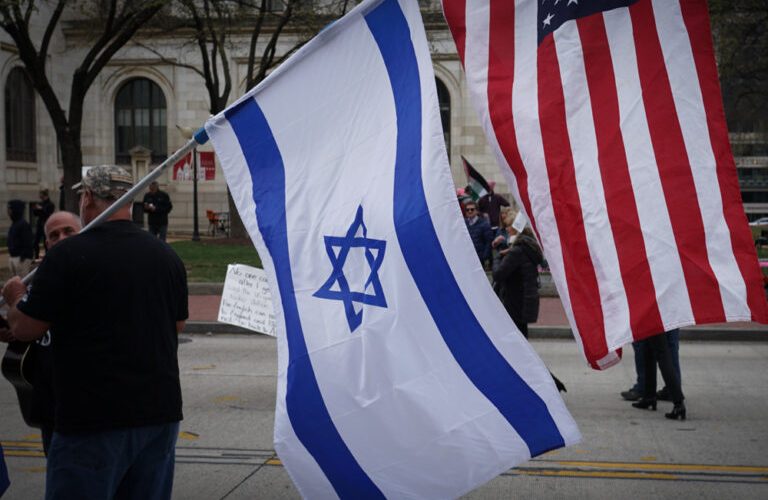Northeastern’s Students for Justice in Palestine (SJP) chapter routinely spreads deeply flawed and distorted characterizations of Zionism and Israel. One post alleges that Zionism has a “fundamental reliance on the subjugation and regular massacring of the Palestinian people.” Another claims that, “while Israel may have elected government for its Jewish citizens, it has no such thing for…nearly 5 million Palestinians.”
However, these grandiose claims are grossly misinformed. Zionism is just the belief that Jews should live free of persecution in their ancestral homeland. It says nothing about how that state should be created, be governed, or treat non-Jews; Zionists repeatedly express their commitment to equality, not “subjugation,” “massacring,” or expulsions.
The Zionist movement gained traction in 1897 when the First Zionist Congress called for, “the settlement of Jewish agriculturists, artisans, tradesmen, and manufacturers…in [the British Mandate of] Palestine.” Jews listened: between 1897 and 1930, tens of thousands made their way to Israel, many of whom fled violent Russian pogroms.
But when Jewish refugees arrived in the British Mandate, they faced severe Arab backlash. In 1921, Arab riots killed about fifty Jews in Jaffa and Arab leaders warned that Jews, “even if admitted in reasonable numbers, would . . . seize the most important places in commerce, in industry and in politics.”
Nevertheless, the Twelfth Zionist Congress proclaimed to have “no intention of trespassing on the legitimate rights of our neighbours. We look forward to a future in which Jew and Arab will live side by side.” Zionist figurehead Ze’ev Jabotinsky wrote in 1923, “I am prepared to take an oath binding ourselves…that we shall never try to eject anyone.”
In 1929, Arabs stormed Jewish homes in Hebron and murdered sixty-seven Jews. Again in 1936, Arabs rioted against Jews. In 1937, Grand Mufti of Jerusalem and Palestinian Arab nationalist leader Haj Amin al-Husseini—who would later meet with Adolf Hitler—referred to Judaism as a disease and Jews as enemies of Islam.
The same year, nearly all Zionist leaders affirmed their commitment to free immigration and opposition to the transfer of land from Arabs to Jews. Chaim Weizman, President of the World Zionist Organization, tearfully pleaded, “we know that the Mufti…[is] not the Arab nation…There is an Arab nation with a glorious past. To that nation, we have stretched out our hand.”
Contrary to SJP’s narrative, Zionist thought leaders never advocated for subjugating Palestinians. Instead, it was high-ranking Arab officials, like al-Husseini, that played a vital role in communicating Nazi propaganda to the Middle East and Northern Africa.
Twice, al-Husseini urged his followers to “kill the Jews wherever you find them.” Regardless, in 1947 Zionists accepted the UN partition plan, establishing both Palestinian and Jewish states, on the basis that Jewish refugees needed a safe haven.
Unfortunately, SJP’s tendency to twist reality doesn’t stop with its portrayal of Zionism: it extends to its characterization of Israel too.
SJP preposterously claims that Israel conducted a “genocidal invasion of Palestine in 1948,” despite the fact that Israel’s 1948 war for independence was defensive in nature; Arab countries surrounding Israel attacked it, not the other way around. And these Arab aggressors expressed genocidal intent: “[T]his will be a war of extermination and momentous massacre,” Arab League Secretary General Azzam Pasha told a newspaper in Lebanon. Jamal Al-Husseini, chairman of the Higher Arab Committee, threatened Israel’s proponents that, upon Israel’s creation, “blood will flow in the rivers of the Middle East.”
The truth about Israel throughout history and today is that it is an oasis of equality in a desert of violent persecution.
Twenty-one percent of Israel’s population—nearly two million people—are Israeli Arabs, of which two-thirds are “proud to be Israeli.” Israeli Arabs hold important positions in both the public and private sectors, even sitting on Israel’s supreme court. In recent months, Israel’s legislative branch, the Knesset, formed a majority coalition that needs the Arab Ra’am party to pass laws, putting Israeli Arabs in an unprecedented position of power. And this new government adopted a series of resolutions “to improve Palestinian economic life, security and self-governance.” These laws increased the number of work permits available to Palestinians, loaned the Palestinian Authority $500 million, and established joint economic commissions for development projects.
Meanwhile, Jordan, Egypt, Lebanon and Syria, each of which border Israel, boast a combined total of thirty-nine Jews. Despite populations larger than ten million people, Jordan and Syria have no known Jewish citizens at all, a direct result of rampant antisemitism.
Israel wants peace, whether with Palestinians or any other country. But time and time and time and time again, Palestinian leaders opt for war instead, employing the same failed “all is mine” tactic they’ve tried for decades. If SJP truly fought for Palestinians’ best interests, it would critique all inhumane treatment of Palestinians, not exaggerate and lie about that by Israel. SJP doesn’t tell you that Jordan arbitrarily revokes Palestinians’ citizenship, that Syria has killed thousands of Palestinians throughout its civil war, and that Lebanon bars Palestinians from owning property. Palestinians in these states have no recourse but to flee.
Overgeneralizations and mischaracterizations should not define Zionism or Israel. Rather, Zionists should, and they are clear: Zionism is not about “subjugation” and expulsion, it is about immigration and equality.
Jake Egelberg is a 2021-22 CAMERA fellow studying biochemistry at Northeastern University.



